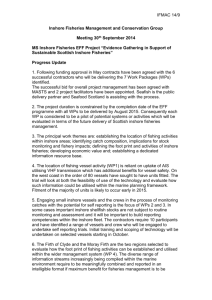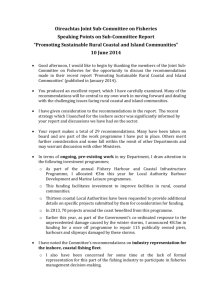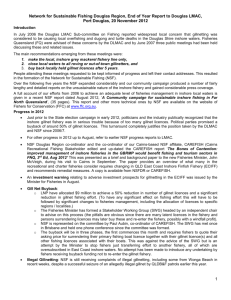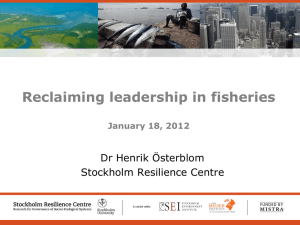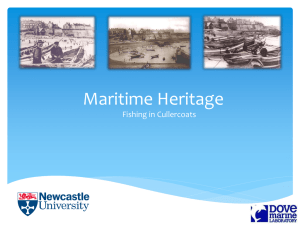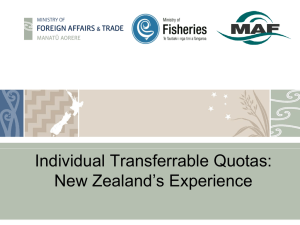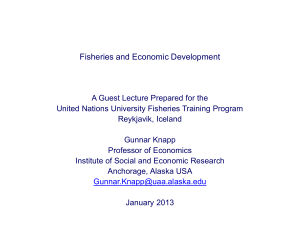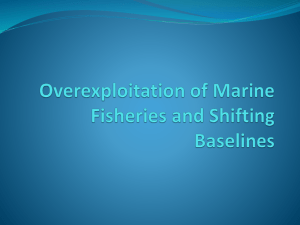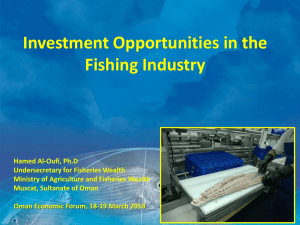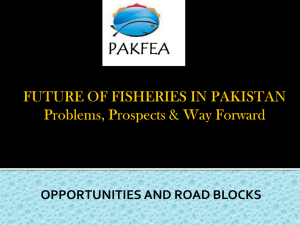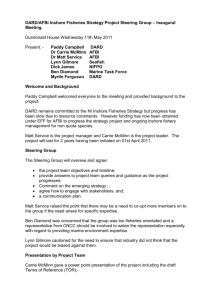View the presentation in power point format
advertisement
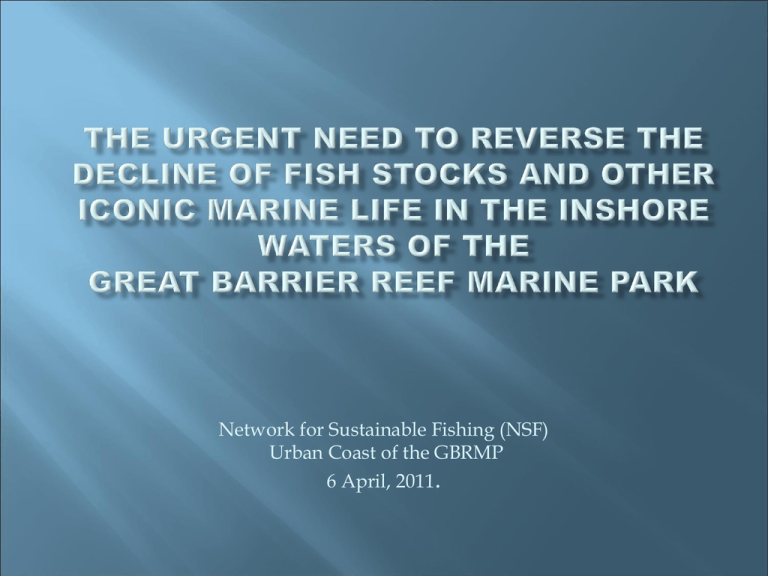
Network for Sustainable Fishing (NSF) Urban Coast of the GBRMP 6 April, 2011. An informal e-network of people having interests in fishing and support industries along the urban coast of the GBRMP OVER-ARCHING CONCERNS The on-going depletion of inshore fish stocks from Rockhampton to Cooktown, Fisheries QLD (FQ) apparently in denial , GBRMPA apparently powerless to intervene. - Following recognition that the inshore fish stocks of the GBRMP are depleted, stocks are managed such that: they are rebuilt and maintained at resilient levels, greater use is made of Net Free Areas such that allowable catches are allocated to provide optimum economic and biodiversity benefits to local communities, and all negative impacts of fishing on non-target species are minimized. Barramundi Blue threadfin Fingermark King threadfin Grey mackerel (left) 1. Government recognizing: that inshore fish stocks are overfished and declining, and the value of rebuilding these stocks and allowing communities to make the best sustainable use of their local fishing grounds. /continued 2. An overhaul of the East Coast Inshore Fin Fish Fishery (ECIFF) regulations, to allow inshore fish stocks to rebuild incl. adequate protection of spawning stocks and nursery grounds (This will help lead to higher value, sustainable catches and boost local economies.) 3. Minimal impact on nontarget species Something is killing our turtles and vets have shown it is not plastic bags. Here are seven of the many dead turtles all washed ashore at or near Wonga Beach , FNQ, 2006 – Apr 2011, all were photographed by the same person. Fishing nets do drown turtles; many people, incl. some local pro fishers, believe nets are responsible for many of the deaths. Dugong along the GBRMP urban coast are at around 3% of their 1960 numbers yet are regularly found stranded, sometimes with tail hacked off and/or bellies slit. The new ‘in-attendance’ regulation of gillnets is ineffective when netters can be asleep in their boat bunks or even 400m from a net and wide awake. Tail hacked off probably to aid release from net Bellies slit open and weighed down to make them sink – not illegal hunting! The rare, endemic Australian snubfin dolphin (left) occurring only in shallow, inshore tropical waters in N. Australia and Qld, is at high risk from netting. A pod was wiped out by shark nets at Ellis Beach near Cairns, (Ross, DEWHA website). The Indo-pacific humpback, top right, (possibly a 2nd endemic species) also only found inshore, is also placed at risk by netting. Humpback whales, incl. Migaloo, on the grey mackerel spawning grounds when offshore netters were operating. Humpback whales, left, photographed in the presence of a fisheries officer and within 300m of netters using 600m of netting. It is just a matter of time! Two decades of dealing with FQ has ended in stalemate and public disenchantment. Input from the recreational and charter fishing sectors, although requested by FQ, has been largely ignored in favour of commercial interests and to the detriment of fish stocks. It is time to make these concerns an election issue and press for changes: in government policy towards fishing, within FQ and to ECIFF regulations. The EPBC Act 1999 under which export fisheries must be assessed to determine whether they can be declared as approved Wildlife Trading Operations, Federal Guidelines for the Ecologically Sustainable Management of Fisheries, The Independent Review of QLD’s ECIFF undertaken in 2008 at the request of the Federal Minister for the Environment The Conditions and Recommendations placed on the ECIFF by the Federal Minister before it could be declared an approved WTO lack of species-specific catch data, gillnet fishing effort data insufficient for management, inadequate data on net interactions with marine mammals, very limited knowledge of the sustainable levels of catch, risky indicators of stock abundance /sustainability, risky level of precaution adopted, some species at high risk of localised depletion, depletions not always obvious when fishery assessments are based on methods used, some significant gaps in a number of important areas, lack of level of flexibility required for a World Heritage Area, need to reduce complexity and ensure sustainability of species, need for a fundamental rethink of the management approach. As a priority DPI&F should … seek broad public and scientific input on the use of spatial management … to reduce the potential for localised depletion of key species ... (findings to be implemented by 31 Dec. 2010 (any progress???) Spanish mackerel, a line-only species, netted on one of their spawning patches Showing near-ripe eggs from a linefished SM caught the same week, nearby The NSF “Review of Concerns ...” publ. on line by Fishers for Conservation (FFC), Aug. 2010, 62pp. (see opposite) considered the new regulations and outlined why they will fail to halt the decline in inshore species, and considered the fishery should not be declared an approved WTO in 2012 unless further changes are made. that iconic inshore fish stocks are depleted, the need to afford greater protection to breeding stock, breeding grounds and nursery areas, the need to naturally rebuild local fish stocks (not re-stocking with fingerlings), the need for communities to make the best economic use of recovered fisheries e.g. through booming recreational fishing and tourism near urban centres, or mackerel being sold in prime condition as line caught table fish and not as cat food because of gluts in a boom-and-bust netting bonanza. Provision of additional short-term funding for a Qld Fisheries Review whereby world leaders in fisheries management review FQ and the ECIFF, The Review to develop and introduce an optimal management framework whereby commercial fishing effort is managed on a appropriately fine spatial scale, Key positions within FQ to be re-advertised (incumbents may re-apply), Formation of a Recreational & Charter Fishing Branch within FQ. Smooth and partially smooth waters around key urban and tourism centres to be declared line fishing only (both commercial & rec), i.e. Urban & Tourism Net Free Areas, All mackerel to be line only species with all by-catch of netted mackerel to be promptly discarded at sea (to close the loophole), Restriction of netting effort by individuals on an appropriately fine spatial scale to encourage better husbandry of resources. Further information is available from your local NSF co-ordinator and at www.ffc.org.au; see also www.sunfishqld.com.au. Please circulate this presentation on your local networks, and to clubs, local schools and especially your local politicians, in this an election year. Additional NSF co-ordinators for areas not already covered are welcomed, please contact one of us. There is no copyright to this presentation, you are free to adjust, cut and paste under the name of your own organisation or network as you may wish. You can help make a difference, please make the time to do so. /References EPBC Act 1999, Section 303FN requires export fisheries to be managed in an ecologically sustainable way and approved as Wildlife Trading Operations, Guidelines for the Ecologically Sustainable Management of Fisheries’, Ed. 2 (2007); see: www.environment.gov.au/coasts/fisheries/publications/pubs/guidelines.pdf; The Independent Review of QLD ECIFF undertaken for the Federal Minister, 31/10/2008; see: www.environment.gov.au/coasts/fisheries/qld/east-coast-finfish/index.html; Conditions and recommendations placed on the ECIFF by the Federal Minister before it could be declared an approved WTO in 2009; see: www.environment.gov.au/coasts/fisheries/qld/east-coast-finfish/index.html NSF, 2010. A review of concerns relating to the offshore gillnet fishery in the inshore waters of the Great Barrier Reef Marine Park in relation to the Guidelines for the Ecologically Sustainable Management of Fisheries with recommendations for early intervention. Ed. David Cook, NSF. Publ. Fishers for Conservation, 62pp; see: www.ffc.org.au/ Grey_Mackerel.html#latest
